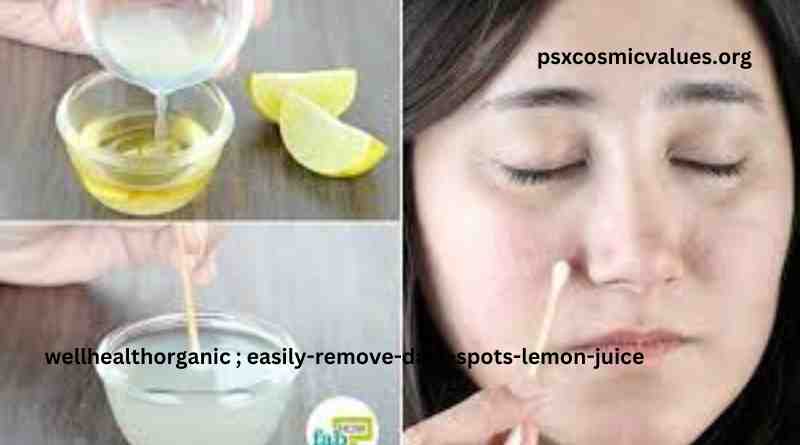In the quest for flawless skin, dark spots are among the most persistent issues that many people face. These spots, also known as hyperpigmentation, can be a result of various factors including sun exposure, hormonal changes, acne scars, and age. While there are numerous products and treatments available in the market promising miraculous results, natural remedies remain a popular and gentle alternative for many. Among these, WellHealthOrganic: Easily Remove Dark Spots with Lemon Juice stands out as a highly effective and accessible option. This article delves into the properties of lemon juice that make it beneficial for skin care, specifically in removing dark spots, and offers a guide on how to use it safely and effectively.
Understanding Dark Spots and Lemon Juice’s Magic
Before diving into the remedy itself, it’s crucial to understand what causes dark spots and how lemon juice can help. Dark spots are essentially areas of the skin that have become darker than the surrounding skin due to an excess of melanin. Melanin is the pigment responsible for skin color, and its overproduction can be triggered by the factors mentioned earlier.
Lemon juice comes into play as a natural bleaching agent, thanks to its high vitamin C content. Vitamin C is a potent antioxidant that helps in reducing melanin production, thereby lightening dark spots. Additionally, lemon juice contains alpha hydroxy acids (AHAs), which contribute to exfoliating the skin and removing dead skin cells, further brightening the skin tone.
How to Use Lemon Juice for Dark Spots

Utilizing lemon juice for skin care requires a thoughtful approach to avoid any potential skin irritation. Here’s a step-by-step guide to using lemon juice effectively for removing dark spots:
- Patch Test: Before applying lemon juice to your face, it’s important to conduct a patch test. Apply a small amount of lemon juice to a part of your skin that’s not overly sensitive, such as your forearm, and wait for 24 hours to check for any adverse reaction.
- Cleanse Your Skin: Always start with a clean face. Use a gentle cleanser to remove any dirt, oil, and makeup, ensuring that the lemon juice can penetrate your skin effectively.
- Dilute the Lemon Juice: Pure lemon juice can be too harsh for the skin, especially for those with sensitive skin. Dilute it with water or a carrier oil like coconut or almond oil. A good ratio to start with is one part lemon juice to two parts water or oil.
- Application: Using a cotton ball or a clean fingertip, apply the diluted lemon juice directly onto the dark spots. Avoid applying it to the surrounding skin to minimize the risk of skin irritation.
- Leave It On: Let the lemon juice sit on your skin for about 20 minutes. It’s enough time for the acid to work without causing damage to the skin.
- Rinse Off: Rinse your face thoroughly with lukewarm water. Avoid using hot water as it can irritate the skin.
- Moisturize: After rinsing off the lemon juice, apply a gentle moisturizer to your skin. Lemon juice can be drying, so it’s important to restore hydration to your skin.
- Sun Protection: Lemon juice can make your skin more sensitive to the sun. Always apply a broad-spectrum sunscreen with an SPF of 30 or higher before going outside, even on cloudy days.
Safety Tips and Considerations
While lemon juice is a natural and effective remedy for dark spots, it’s not without its precautions. Here are some important safety tips to consider:
- Sun Sensitivity: As mentioned, lemon juice can increase your skin’s sensitivity to the sun. Always protect your skin with sunscreen to prevent sun damage and further darkening of spots.
- Skin Irritation: If you experience any burning, stinging, or irritation during the application, wash off the lemon juice immediately and discontinue its use. It might not be suitable for your skin type.
- Frequency: Start by using lemon juice on your dark spots 2-3 times a week. Monitor your skin’s response, and adjust the frequency accordingly. Overuse can lead to skin irritation or damage.
- Nighttime Use: Consider applying lemon juice in the evening to reduce sun sensitivity issues.
Alternatives to Lemon Juice
For those whose skin does not react well to lemon juice or prefer different remedies, there are other natural alternatives. Ingredients such as aloe vera, turmeric, and green tea also possess properties that can help in lightening dark spots. Similarly, over-the-counter products containing ingredients like hydroquinone, kojic acid, and glycolic acid can be effective, though they might not be as gentle as natural remedies.
Conclusion
Lemon juice is a versatile and potent natural remedy for removing dark spots, offering a cost-effective and accessible solution for enhancing skin health. However, its application requires careful consideration and adherence to safety guidelines to avoid adverse effects. Always listen to your skin and consider consulting a dermatologist before trying out new treatments, especially if you have sensitive skin or underlying skin conditions. With the right approach, lemon juice can be a valuable addition to your skin care routine, helping you achieve a clearer, more radiant complexion.
READ ALSO: CHECK

